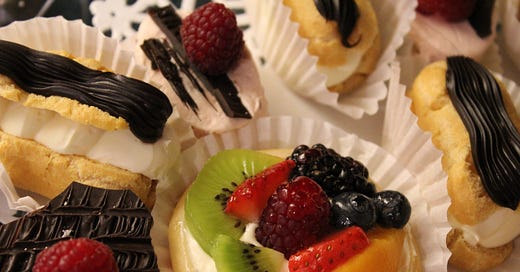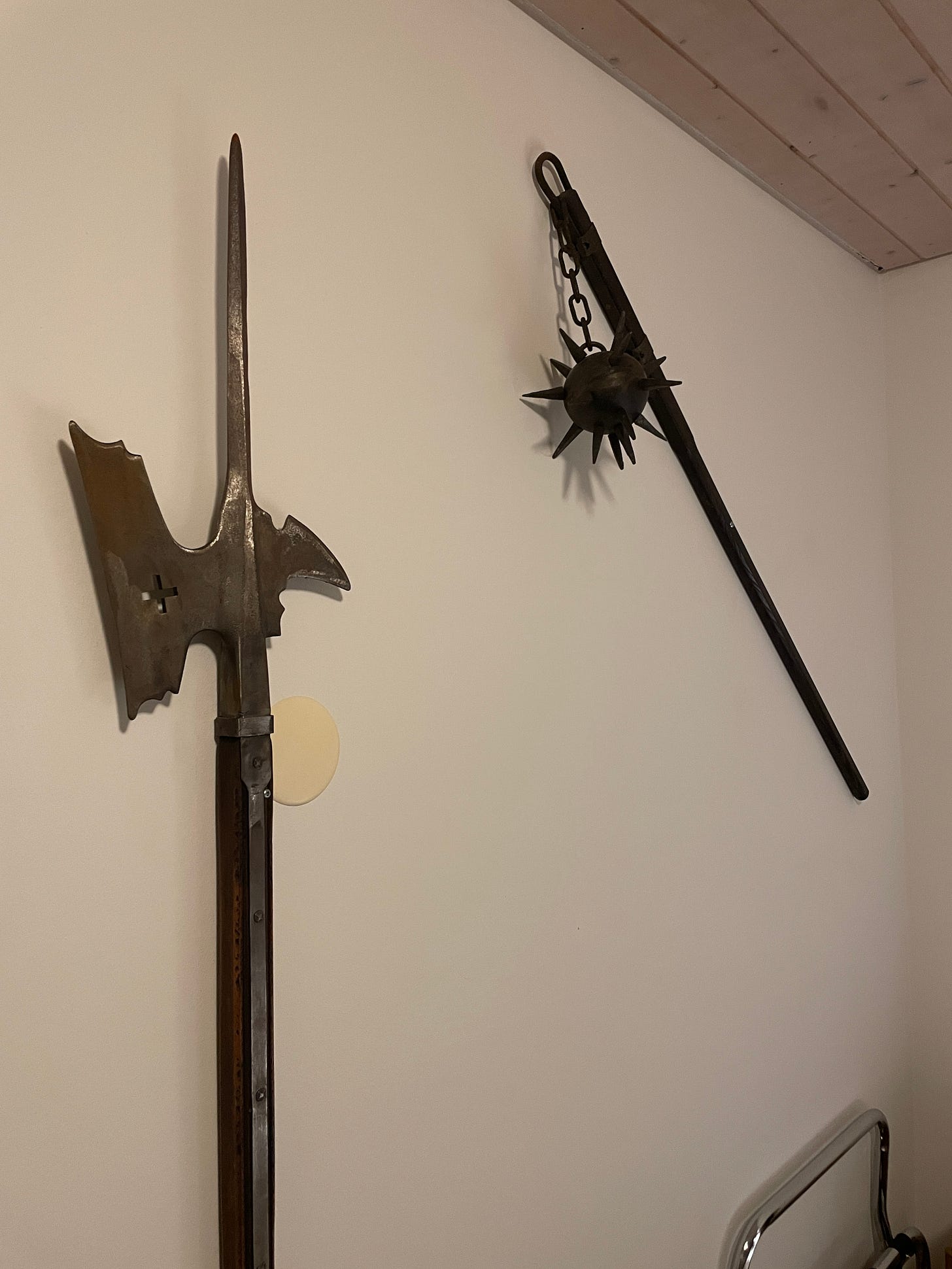I used to hate long car journeys, but now I quite like them. I feel a flicker of something like excitement every time I pack up a car. It’s a tiny taste of what air travel used to feel like, before the shuffling queues and the see-through bags of tiny bottles, and the barked instructions to remove your belt or trainers, and the squeezing of yourself into a seat designed for a human who perhaps grew up in medieval times, but who would definitely have longer legs now.
Air travel feels like punishment for some crime no one has bothered to tell you about, but a long car journey feels like an adventure.
It started, for me, during the pandemic. I had a message on the platform I will always call Twitter from someone who had read my first book, The Art of Not Falling Apart. The woman who messaged me had read about my tiny flat in Tuscany, the place I made an offer on before I’d even see it because I fell in love with it online. She knew, because she had read the book, what it meant to me to have a bolthole in the country of my birth, a place I could retreat to when times were tough and where I could write, dream, eat and sleep, stare out at hills dotted with cypresses and olive groves and stick my face, stick my whole body, in fact, in the sun.
She messaged me when we were just emerging from a time when it was a treat to leave the house for an hour a day, a time when humans felt dangerous. This woman, who I had never met but who has now become a dear friend, asked if we were planning to drive out to my little flat and if so, would we like to stop off at her house in France on the way?
To cut a long story short, we did. In order to avoid getting on a plane, at this time when we didn’t know if there would ever be a vaccine, we decided to take several days to do what we would usually do in a few hours.
It was a thrill to stop at a service station for a take-away cup of coffee. It was a thrill, but also slightly frightening, to use a public loo. When we reached the woman’s house, in a village in the south of France, I felt as if I had stumbled into Alain-Fournier’s lost domain. My new friend cooked a meal for us, in PPE. We ate it on a terrace as the sun set. It felt as transgressive as an orgy and about a million times more enjoyable. (I wouldn’t want to assume, but if Eyes Wide Shut is anything to go by, I’d rather have my eyes ripped out.)
We stayed with our new friend and her partner on our drive back, too. It was there, when Anthony had sneaked up, ostensibly to go to bed but actually to look at property websites, that he spotted the Umbrian house on a hillside that has become our other life, our other home.
The car journeys have become part of the other life. They’re like a pilgrimage, one where you could, at any point, stop and kiss the ground. You can’t, of course, when you’re in a tunnel under the ocean, but what a miracle it is to sit in your little metal box in a tunnel under the ocean! You can’t see the cod, conger, thornback, bass, smooth-hounds, whiting, dogfish, dabs or even sharks (because apparently there are sharks), but you know they’re there. Who cares about swimming with dolphins? I like driving with sharks!
We drove first to avoid getting on planes and then because the cost of car hire during the pandemic had soared to levels that matched a luxury cruise. We discovered that you could, for a non-exorbitant price, leave a car at the airport, for the six months that Italian laws allow a Brit to keep a car in the country. We thought we had it all down to a fine art. Until we discovered the cost of insurance.
And so, last weekend, we drove my car back from Italy for the last time. When I say my car, I mean my late brother’s car, the car that was parked on his drive for more than eighteen months after he died. At first, I didn’t want to get in it. I thought it would be too painful to grasp the steering wheel he used every day, grip the hand-break he gripped, sit where he sat. Over time, that changed. Now, sitting in his car makes me feel close to him.
He was unusual, my gentle giant of a brother. He called his car, a white Nissan Note, White Knight. I wouldn’t want to tell him that the time has come to say goodbye to White Knight. My own white knight has a blue Fiat 500. One car for two is quite enough. I can just about remember from my school Latin that fiat means “let it be done”. And so it shall pass. We will keep the Fiat. The Nissan, which is, by the way, the name of the river that runs through my mother’s home town in Sweden, will have to go.
The journey, it has to be said, wasn’t ideal. It was grey. It was wet. There was an accident, and an hour’s delay, near Milan. There were signs on the motorway saying that winter tyres or snow chains were obbligato at the border to Switzerland. We didn’t have winter tyres or snow chains. Anthony had checked and said they weren’t needed. I told him that he didn’t know Italian police. We bickered over snow chains. When we passed, unstopped, through the border it was clear that he was right and I was wrong. I should have been pleased, but we were tired, and our dinner took a long time to arrive, and the pillows in our Swiss hotel room were tiny and we couldn’t turn the heating off and there were agricultural instruments and what looked like medieval weapons on our bedroom wall.
We both felt better for some sleep and left with the weapons still hanging on the wall. Swiss roads are superb. French roads are superb. (Italian roads aren’t quite so impressive, but no one goes to Italy for the smooth driving experience. Plus, a pristine stretch of tarmac has suddenly appeared outside our nearest town. Something to do with an EU grant, apparently. Nothing like “free” money to get things done!) When the petrol gauge started beeping, we decided it was time to pull over to an Aire for petrol and café crème.
I love the fact that French service stations are called Aires. Google Translate offers me options ranging from district, region and zone to realm, sphere, sweep, belt, neck of the woods, manor, turf. It also, of course, makes you think of actual air (also air in French), of space, breath, time to think, perhaps even an Alpine meadow.
It makes you think of what you need to survive.
One of the things I need to survive is cake. My Swedish mother brought me up to believe you should never have a cup of coffee without a tiny cake. In Sweden they call the coffee and cake ceremony that punctuates the day fika. I have no idea what they call it in France. I’ve always had the sense that eating cakes is pretty much illegal for French women. I think if you’re a French woman you’re meant to glance de haut en bas at a cake counter, whip out your Gauloises from the pocket of the chic blazer that envelopes your skinny frame, light up and blow some kind of smoke ring that effectively conveys your contempt for the childish treats that seduce lesser females into a dégoûtant lack of self-control. Like, for example, Brits.
Anyway, this aire was spanking clean, stylishly furnished and blissfully empty. The women behind the counter were smiley and quite well padded. And oh my God, the cakes. As we gazed at them in wonder, the women smiled even more. Tartes aux framboises. Tartes aux pommes Normande. Macarons. Mille-feuilles. Eclairs au chocolat. And a whole range of patisserie that was clearly made to be nibbled on a terrace in Montmartre.
We plumped for some kind of pastry dusted with almonds.
What can I tell you? It was the Platonic ideal of a pastry. It was, well, light as air. I have an embarrassing habit of emitting “mmm, mmm” noises when I’m eating something truly delicious. It’s not quite “I’ll have what she’s having”, but it’s not all that far off. Honestly, that pastry. It will remain, for me, the madeleine of pastries, the one that will for ever connect me with long drives through France. That pastry, that café crème, that aire, made my day.
It left me pondering the difference between fine and so much better than fine. There’s a business book with the title Good to Great. I haven’t read it, obviously. Titles matter and I can’t help thinking that anyone who uses the word “great” about a company, as opposed to say, a Shakespeare play or a Rembrandt painting, is guilty of what you might call premature ejaculation. Let history be the judge etc. But the difference between OK and good, or really good, is the difference between time ticking on unremarkably and time seized and savoured. It’s the thing that can make you feel special. It’s the thing that can make you feel that you’re worth the effort.
We’re in that time of year when almost everything feels like an effort. It’s cold. It’s generally grey. It gets dark almost as soon as you get up. Today is even called Blue Monday because it’s a day when everyone is expected to feel miserable.
I refuse to be miserable. I will go to a party tonight and eats lots of canapés and drink lots of delicious wine. I will also try to remember that my efforts, like your efforts, like everyone’s efforts, can be other people’s sweetness, light – and air.
New year, new you etc. I’m taking on a few more coaching clients. If you’re interested in finding out more about how I work, do have a look at my coaching website (also called The Art of Work) and do get in touch.







Lovely article, Christina. Lovely tribute to White Knight!
Haha - long car journeys across Europe... remember London to Perugia & back in my parents’ VW combi (all 8 of us!)?? Wherever did we stay en route? - don’t think it involved any patisseries or strange implements in the bedrooms for that matter. I do remember having to top up the engine oil several times on the pass over the Alps...
Lovely piece, thank you. Hope your Monday has been a very unblue one.